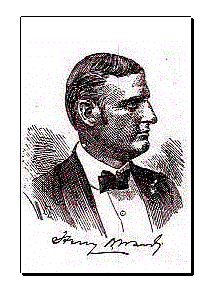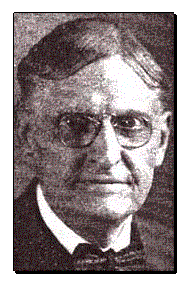 Dr. Henry Baldwin Ward was born into a family of highly regarded
scientists. His father, Richard Halsted Ward, was a noted Microscopist who made many
advances and inventions in his field. His Aunt, Anna Lydia Ward, in 1886, traveled farther
North than, any other American woman to that date. Her study of the Eskimos in
Northern Labrador formed the basis of an illustrated lecture tour that she gave throughout
the country. She was also the author of a number of books on poetry and prose. With this
kind of background it is no wonder that Henry became a scientist of note
himself. Today, the highest award given in the field of parasitology is the "Henry Baldwin
Ward" medal. Henry may also be thought of as one of America's first conservationists.
Dr. Henry Baldwin Ward was born into a family of highly regarded
scientists. His father, Richard Halsted Ward, was a noted Microscopist who made many
advances and inventions in his field. His Aunt, Anna Lydia Ward, in 1886, traveled farther
North than, any other American woman to that date. Her study of the Eskimos in
Northern Labrador formed the basis of an illustrated lecture tour that she gave throughout
the country. She was also the author of a number of books on poetry and prose. With this
kind of background it is no wonder that Henry became a scientist of note
himself. Today, the highest award given in the field of parasitology is the "Henry Baldwin
Ward" medal. Henry may also be thought of as one of America's first conservationists.
The following biography is a reprint from "The
Dictionary of American Biography," Supplement Three, 1941-1945; pages 802-803;
Charles Scribner's Sons, Inc. New York, 1973; Edward T. Jones, Editor.
WARD, HENRY BALDWIN (Mar. 4, 1865-Nov. 30,
1945), zoologist and parasitologist, was born in Troy, N. Y., one of four children and the
older of the two sons of Richard Halsted Ward, physician and microscopist, and Charlotte
Allen (Baldwin) Ward. Both parents were natives of Bloomfield, N. J. Henry B. Ward
attended the public schools of Troy and Williams College (his father's alma mater), from
which he graduated, A. B., in 1885. After three years of teaching science in the Troy high
school, he went to Europe in 1888 for graduate study in zoology, and for two years
attended the universities of Göttengen, Freiburg, and Leipzig, spending the vacation
periods at the marine laboratories of Naples, Ville-Franche-sur-Mer, and Helgoland. He was
particularly influenced by Prof. Rudolgh Leuckart of Leipzig, an authority on the
invertebrates and founder of the celebrated laboratory of parasitology. At Leipzig, Ward
conceived the ambition to found a similar laboratory in the United States. Upon his return
in 1890, he entered the graduate school of Harvard University, where he received the Ph.
D. degree in 1892, with a dissertation on the marine nematomorph Nectomnema agile,
Verrill, a species he had observed at Naples.
Ward was appointed instructor in zoology at the
University of Michigan in 1892 but moved after a year to the University of Nebraska, at
first as associate professor, from 1896 as professor. While at Nebraska he published a
series of papers on the parasites of man and discovered the presence in the United States
of the human lung fluke, Paragonimus. He played a major role in developing a
two-year premedical course and in 1902 became the first dean of the University of Nebraska
College of Medicine, newly established at Lincoln in affiliation with the Omaha Medical
College. In 1909, however, plans were made to move the Lincoln unit to the Omaha campus. When it became clear that, because of rivalries between the two medical faculties, Ward
would not be retained as dean after the move, he resigned.
That fall he went to the University of Illinois
as head of the department of zoology, a position he was to occupy with distinction until
his retirement in 1933. In addition to teaching zoology at the undergraduate level, he
established one of the first research laboratories in the United States to offer graduate
work in parasitology. The large number of students who received the Ph. D. under his
supervision later made significant contributions to the growth of this science. To provide
an outlet for publishing the results of such research, he inaugurated in 1914, with the
assistance of his colleagues Stephen A. Forbes and William Trelease, the series of
Illinois Biological Monographs. That same year he also founded the Journal of
Parasitology, the first American publication devoted to the field; he continued to
edit the journal until 1932, when he presented it to the American Society of
Parasitologists to become its official organ.
Ward's research reflected in part his love of
the outdoors. He early began biological research on the Great Lakes, at first for the
Michigan Fish Commission. For many years, beginning in 1906, he conducted summer field
investigations of the Alaska and Pacific salmon. Besides his papers on parasites, which
dealt with such subjects as parasites of the human eye, the relations of animal parasites
to disease, and the spread of fish tapeworm, he was the co-author, with George Chandler
Whipple, of Fresh-Water Biology (1918), long a standard work. An active member of
the Izaak Walton League of America, of which he was president, 1928-30, and of the
National Wild Life Federation, Ward was deeply concerned with national problems of
wildlife conservation and the pollution of streams.
Ward belonged to a large number of scientific
societies and was a leader of many, including the American Microscopical Society
(president, 1905), the American Society of Zoologists (president 1912-1914), and the
American Society of Parasitologists, of which he was the first president when it was
founded in 1925. He contributed significantly to the development of the American
Association for the Advancement of Science, as the secretary of Section F (zoology) in
1900, general secretary (1902), vice-president (1905), and permanent secretary (1933-37);
and the scientific honor society, Sigma Xi, as secretary (1904-1921) and president
(1922-23). Ward was influential also in university affairs. At Illinois he worked closely
with President Edmund J. James; articulate and well-spoken, he was particularly effective
on faculty committees. He received honorary doctorates from the universities of Cincinnati
(1920), Oregon (1932), and Nebraska (1945) and from Williams College (1921).
Ward was a handsome, vigorous man, somewhat
above average height; Aristocratic, autocratic, ambitious, and enthusiastic, he demanded
excellence of himself and of others. On Sept. 11, 1894, he married
Harriet
Cecilia Blair of Chicago, who was teaching at the music school of the University of
Nebraska. They had two daughters, Cecilia Blair and Charlotte Baldwin. Ward was a member
of the Presbyterian Church. He died in Urbana, Ill., of a heart attack in his eighty-first
year, and was buried there in Mount Hope Cemetery. Sometimes called the "Father of
American Parasitology," he was to America what Leuckart had been to Germany.